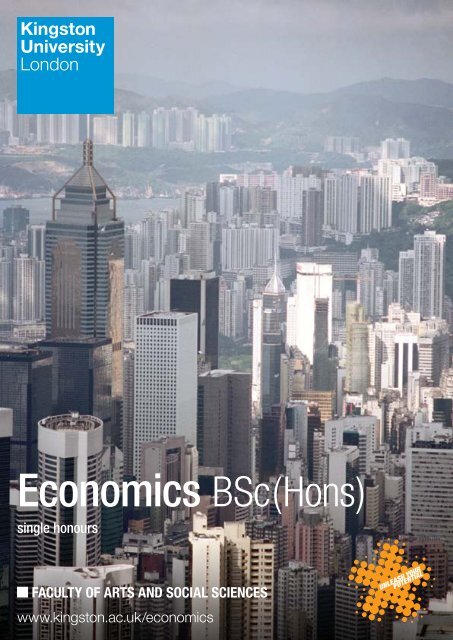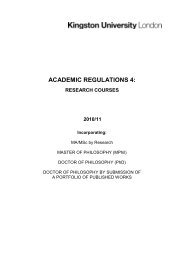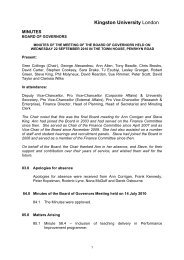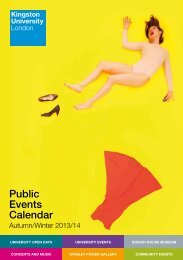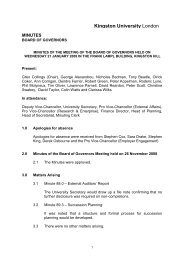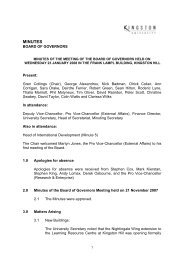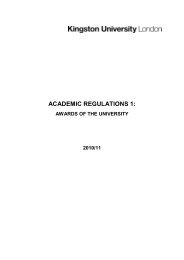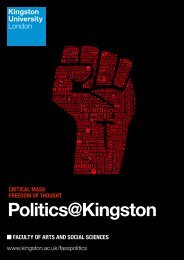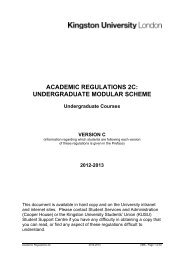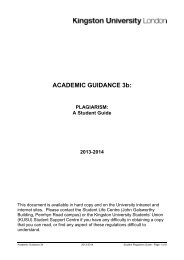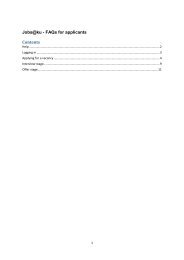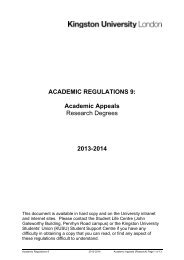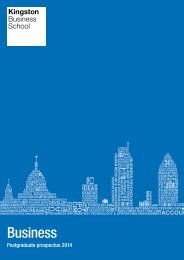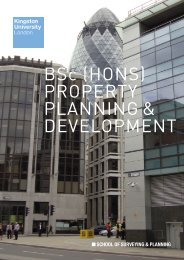Download a PDF course booklet - Kingston University
Download a PDF course booklet - Kingston University
Download a PDF course booklet - Kingston University
You also want an ePaper? Increase the reach of your titles
YUMPU automatically turns print PDFs into web optimized ePapers that Google loves.
Economics BSc(Hons)<br />
single honours<br />
Faculty of Arts and Social Sciences<br />
www.kingston.ac.uk/economics
Economics BSc(Hons)<br />
single honours<br />
Economics is concerned with the production,<br />
consumption and distribution of wealth, and aims<br />
to explain the reasons for, and consequences of,<br />
decisions made by individuals, households, firms<br />
and governments.<br />
In studying economics, you will:<br />
• explore why people make the decisions that<br />
they do and what the consequences of those<br />
decisions are;<br />
• enhance your understanding of the real world by<br />
developing appropriate economic theories;<br />
• investigate the economic role of institutions such<br />
as markets, productive enterprises, households<br />
and government; and<br />
• use quantitative methods to test the predictions<br />
of economic theories.<br />
This degree provides a thorough grounding in the<br />
core topics of economics and is ideal if you plan<br />
to study economics at postgraduate level.<br />
Why study economics at<br />
<strong>Kingston</strong> <strong>University</strong>?<br />
• <strong>Kingston</strong>’s degree in Economics will provide<br />
you with a strong foundation for a career as<br />
an economist.<br />
• The <strong>course</strong> also provides good preparation<br />
for postgraduate study of economics.<br />
• Core aspects of economics are developed<br />
throughout the <strong>course</strong>.<br />
• A wide choice of option modules in Years 2<br />
and 3 enables you to tailor your studies to<br />
your interests and career aspirations.<br />
• You can choose from option modules in<br />
business economics or financial economics.<br />
• In the recent National Student Survey,<br />
students reported that economics teaching<br />
at <strong>Kingston</strong> is intellectually stimulating (76<br />
per cent), and that they were taught by<br />
staff who are good at explaining things (77<br />
per cent) and were easily contacted when<br />
needed (75 per cent).<br />
Source: www.unistats.direct.gov.uk<br />
Teaching, assessment and support<br />
<strong>Kingston</strong> has a reputation for excellent teaching<br />
quality, with the Economics department having<br />
scored high marks in official inspections carried out<br />
by the government’s Quality Assurance Agency.<br />
Teaching methods include lectures, seminars and<br />
workshops, group work, small group tutorials and<br />
individual study. You will be assessed in a number<br />
of different ways, including tests, exercise sheets,<br />
essays and examinations.<br />
You will have access to first-rate resources to help<br />
you to study in greater depth:<br />
• We will show you how to use information<br />
technology to support your work as an economist.<br />
• Course materials are accessible via the internet<br />
using StudySpace, our web-based learning<br />
management system.<br />
• You will have access to excellent library and<br />
computing facilities.<br />
• We will help you develop the study skills needed<br />
at university.<br />
• Our arrangements for student support have<br />
been officially awarded top marks.<br />
Economics students finish their studies with<br />
the Working as an Economist module, which is<br />
designed to bring together all of the skills learnt<br />
throughout the degree. Success in the module<br />
signals your status as an independent learner, and<br />
this work will occupy pride of place in the portfolio<br />
of written pieces that you can use to demonstrate<br />
your abilities when applying for jobs or for further<br />
study. You will work both independently and<br />
with others to research a chosen topic, and<br />
will produce an individual report and prepare to<br />
present your results to other students at a twoday<br />
conference.<br />
Employers tell us that the things they most<br />
value in graduate recruits are skills in teamwork,<br />
presentation, and giving and receiving feedback.<br />
The Working as an Economist module develops all<br />
these skills – skills that employers say are also the<br />
hardest to find.<br />
Personal Tutor Scheme<br />
The teaching team is committed to providing<br />
the support you need to facilitate your transition<br />
to university life. We pride ourselves on our<br />
approachability and readiness to help. The<br />
personal tutor scheme, designed to help you from<br />
your very first week, is the embodiment of this<br />
commitment. As an integral part of your first year of<br />
study, you will be placed in a small seminar group,<br />
led by the same member of the teaching team<br />
for the whole year. That seminar leader will also<br />
be your personal tutor – not just for the first year,<br />
but throughout your degree – providing support in<br />
your learning, your personal development and in<br />
developing your career aspirations.<br />
Careers and employability<br />
Studying economics will help you develop the<br />
numeracy and literacy skills that employers value.<br />
Economics graduates work in a wide variety<br />
of sectors, including business and finance (for<br />
example, as accountants and investment advisers);<br />
marketing, sales and media; commercial, industrial<br />
and public sector managers; science, engineering,<br />
IT, healthcare and teaching.<br />
Information and guidance on career and<br />
postgraduate opportunities is available throughout<br />
your time at <strong>Kingston</strong>.<br />
What do our graduates do?<br />
Our graduates find employment in a wide range<br />
of occupations, such as economists in the City of<br />
London, and in management positions nationally,<br />
internationally and in the public sector. Many of<br />
our students progress to study at postgraduate<br />
level. Below are examples of the varied careers<br />
followed by our graduates:<br />
• Business forecaster<br />
• Economist<br />
• Director of a government agency<br />
• Financial planner<br />
• Investment manager<br />
• Marketing brand manager<br />
• Securities trader<br />
• TV producer/director<br />
• <strong>University</strong> lecturer
What you will study<br />
Examples of the modules currently offered are shown below. The module list<br />
can vary from year to year as the <strong>course</strong> structure is reviewed and refined.<br />
Our programme<br />
<strong>Kingston</strong> <strong>University</strong>’s Economics field enables<br />
you to specialise in pure economics and will give<br />
you a thorough grounding in the core topics of<br />
economics and associated analytical skills. You will<br />
be able to extend your knowledge in areas of your<br />
choice by selecting option modules within the field.<br />
Economics at <strong>Kingston</strong> enables you to develop<br />
the depth and breadth of your knowledge of<br />
economics in both its theory and applications. The<br />
<strong>course</strong> will encourage you to consider issues that<br />
affect the daily lives of us all, such as:<br />
• What effect do professional sports teams have<br />
on the local economy?<br />
• Should entry to museums and galleries be free?<br />
• Under what circumstances might the<br />
introduction of minimum wage laws lead to<br />
increased employment?<br />
• What is the risk that government spending might<br />
crowd out investment by private firms?<br />
• What are the long term effects of population<br />
growth and technological progress on economic<br />
growth?<br />
<strong>Kingston</strong> Language Scheme (KLS)<br />
KLS enables you to learn a foreign language<br />
alongside your programme of studies, completely<br />
free of charge. You can choose modules in Arabic,<br />
French, German, Italian, Japanese, Mandarin<br />
(Chinese) and Spanish, with or without prior<br />
knowledge of the language.<br />
Studying abroad<br />
Subject to availability and academic performance,<br />
you will have the chance to spend Year 2 of your<br />
studies abroad, still completing your degree in three<br />
years. Many current students have studied abroad<br />
in Continental Europe, the United States, Australia<br />
and New Zealand. Studying abroad helps students<br />
to become more effective, independent learners,<br />
and provides the opportunity for new experiences<br />
and insights in different parts of the world.<br />
Centre for Academic Skills<br />
and Employability (CASE)<br />
CASE offers students from the Faculty of Arts<br />
and Social Sciences one-to-one help with<br />
their studies, supporting both undergraduate<br />
and postgraduate students with researching<br />
and presenting, structuring and editing<br />
traditional academic writing, structuring and<br />
editing multimedia texts, and referencing.<br />
In Year 1 you will study microeconomics<br />
(concerned with the effects of individual decisions)<br />
and macroeconomics (concerned with large-scale<br />
or general economic factors, such as interest rates<br />
and economic growth). A module in mathematics<br />
and statistics provides the necessary quantitative<br />
foundations for the study of economics, while the<br />
Capitalism module develops the historical and<br />
intellectual background to modern economics.<br />
All students take a tutorial module that develops<br />
study skills and personal development planning.<br />
Year 2 includes the core module Contemporary<br />
Issues in Economics. You will also study core<br />
modules in microeconomics, macroeconomics<br />
and mathematical and statistical techniques.<br />
During your second year, you will have the<br />
opportunity to spend a period of time abroad<br />
at one of our prestigious partner universities in<br />
Europe or further afield.<br />
Year 3 sees a more advanced treatment of<br />
macro- and microeconomic analysis in the<br />
Advanced Economic Analysis module. The<br />
module Working as an Economist will enable you<br />
to focus on a detailed topic in core economic<br />
policy and principles or to extend your interest<br />
to related fields; the range of option modules<br />
provides similar opportunities.<br />
Year 1 modules<br />
Becoming an Economist is designed to help<br />
you develop many of the basic skills used in the<br />
discipline of economics. The module explores<br />
and covers a variety of study and research<br />
techniques. You will develop skills in the use of<br />
language, writing, ICT usage, data collection,<br />
data interpretation and groupwork. Key threshold<br />
economic concepts will also be incorporated.<br />
Particular emphasis will be placed on small group<br />
learning and personal development planning.<br />
Economic Policy and Principles introduces<br />
the techniques of model building and analytical<br />
reasoning used in microeconomics. Some of<br />
these techniques are then used as an input into<br />
the analysis of economics at the macroeconomic<br />
level. In the early phase of the module, you will<br />
be taught about microeconomic models and<br />
explore the application of these models to current<br />
economic issues. In the later phase, you will learn<br />
about the main macroeconomic aggregates,<br />
the basic model of aggregate demand and<br />
supply, and the importance of the time horizon in<br />
macroeconomics. Throughout the <strong>course</strong>, there is<br />
an emphasis on highlighting and considering the<br />
pros and cons of the suggested solutions to real<br />
problems faced by market economies.<br />
Economics Quantitatively Treated 1 provides<br />
an introduction to mathematical and statistical<br />
techniques – you will be prompted to appreciate<br />
how mathematical reasoning is used in economics,<br />
and develop skills in the numerical, graphical and<br />
statistical analysis of economic data. The module<br />
starts with a review of material that may have been<br />
encountered in your previous studies, such as<br />
mathematics at GCSE or IB level, and moves on<br />
to developing your knowledge, understanding and<br />
ability to apply quantitative concepts – of particular<br />
relevance for microeconomics, macroeconomics<br />
and econometrics.<br />
Capitalism offers a detailed survey of the origins<br />
and emergence of capitalism and the economic<br />
thinking that paralleled these developments. It will<br />
then develop key aspects of the contemporary<br />
economy – firms and competition in the national<br />
and international environment and the role of the<br />
state in national and supra-national contexts. It<br />
will proceed with an introduction to the role of<br />
finance in capitalism and the nature and causes of<br />
financial crises.<br />
CASE also provides a range of resources to<br />
enhance employability, including help with<br />
writing CVs, application forms and interview<br />
preparation. Results show that students who<br />
use the centre are significantly more likely<br />
to complete their degrees. As students are<br />
better equipped to act on feedback, they also<br />
tend to do better in their studies.<br />
„<br />
Want to know more?<br />
www.kingston.ac.uk/<br />
economics
Year 2 modules<br />
Contemporary Issues in Economics aims to<br />
develop your ability to apply economic analysis to<br />
a range of contemporary economic problems and<br />
policies.<br />
Economics Quantitatively Treated 2 will extend<br />
the knowledge of mathematical and statistical<br />
techniques acquired in Year 1, and will introduce<br />
multivariate techniques in mathematics and<br />
statistics. It will assist your comprehension of<br />
Year 2 economics modules and encourage you to<br />
understand the benefits of using a mathematical<br />
and statistical vocabulary and reasoning to<br />
analyse economic models. This module will equip<br />
you with sufficient quantitative techniques to be<br />
able to undertake any Year 3 module in economics<br />
that requires quantitative analysis.<br />
Macroeconomics aims to develop and build<br />
mainly on knowledge acquired in the Economic<br />
Policy and Principles module in Year 1, but<br />
also on the Economics Quantitatively Treated<br />
module. It provides fundamental knowledge on<br />
the key areas of macroeconomic theory and<br />
policy in the short run and long run, and within<br />
both closed- and open-economy settings. Realworld<br />
applications are signposted at the earliest<br />
opportunity. On completion of the module you<br />
will be able to comprehend key macroeconomic<br />
theories and policies, and illustrate the application<br />
of macroeconomic models and principles in the<br />
context of policymaking.<br />
Microeconomics will develop the model building<br />
techniques encountered in Year 1, and extend<br />
the scope of these models to a wider range of<br />
problems. It will show the use of microeconomic<br />
models in a problem-solving context, and will<br />
provide an analytical basis for subsequent elective<br />
(option) modules. On completion, you will have a<br />
good knowledge of the major techniques and issues<br />
in modern microeconomic theory and policy, and<br />
how to apply this knowledge in the discussion and<br />
evaluation of contemporary microeconomic issues.<br />
Year 3 modules<br />
Advanced Economic Policy and Principles<br />
considers recent developments in micro- and<br />
macroeconomic theory and policy. This involves<br />
the incorporation of market imperfections and<br />
institutions into formal models, and the use<br />
of more-advanced techniques in economics.<br />
The interaction between models and data in<br />
macroeconomics is emphasised where appropriate.<br />
Working as an Economist provides an<br />
opportunity to demonstrate the cumulative skills<br />
and techniques you have acquired through the<br />
study of economics. As the culmination of a<br />
programme of supporting lectures and group<br />
workshops, you will work independently to write<br />
a 5,000-word extended essay on a subject topic<br />
in economics to be presented at an internal peer<br />
conference. The module is designed to further<br />
your skills in writing and presenting economic<br />
analysis, together with achieving a higher level of<br />
understanding in a chosen area. The <strong>course</strong> aims<br />
to improve your ability to function in the medium<br />
of economics, and provides generic and specific<br />
skills that can enhance employability.<br />
Economics of Organizations and Strategy<br />
develops pluralist approaches to understanding<br />
the aims, methods and outcomes of production<br />
and exchange organisations (‘businesses’, for<br />
short), with particular reference to the limitations,<br />
as well as the possibilities, of markets. The core<br />
theme is the contrast between neo-classical and<br />
other perspectives, including the ‘capabilities’<br />
approach, transaction cost economics and other<br />
heterodox schools of thought. Particular themes<br />
include the aims and methods of business<br />
strategy, the ‘make or buy’ decision, the nature<br />
of relationships within and between businesses,<br />
and the costs and benefits of different systems of<br />
governance of economic exchange.<br />
Development Economics will introduce the<br />
economic structure of developing countries, the<br />
specific challenges they face and their position in<br />
world economy today. It should interest all students<br />
who wish to acquire a good background in issues<br />
of growth and development in lower income<br />
countries and their significance for world economy.<br />
The module starts by introducing theories of<br />
economic development and measurement issues. It<br />
will examine some problems affecting all or groups<br />
of these countries, such as population growth,<br />
poverty, environment, income distribution, structural<br />
adjustment and volatile capital flows. It will also deal<br />
with policy issues specific to developing countries.<br />
Econometrics introduces and develops new<br />
topics based on knowledge acquired in Economics<br />
Quantitatively Treated 1 and 2. It provides<br />
fundamental knowledge on statistical techniques<br />
and their applications to real-world data. On<br />
successful completion of the module, you will be<br />
able to demonstrate quantitative analytic skills for<br />
assessment of economic theories with matching<br />
data, which will be helpful for various career<br />
opportunities and advanced study of economics<br />
and business at postgraduate level.<br />
Finance, Risk Management and Instability<br />
introduces the contemporary workings of financial<br />
markets with an emphasis on risk management.<br />
It will cover some of the main topics of financial<br />
theory, including economic risk, portfolio theory<br />
and the efficient markets hypothesis. It will also<br />
introduce you to the key instruments of derivatives<br />
markets, analysing their trading mechanisms<br />
and established patterns. The module will further<br />
deal with advanced aspects of corporate finance<br />
and it will conclude by addressing the policy<br />
responses in the context of a contemporary world<br />
characterised by increasing financial instability.<br />
Core factual material is provided via StudySpace<br />
with keynote lectures and selected worksheets<br />
used to explain concepts. The module provides<br />
the essential groundwork not only for the<br />
understanding of practical issues regarding<br />
financial markets and corporation management<br />
but also for a successful postgraduate studies.<br />
Mathematical Economics is designed to inform<br />
you of the deeper aspects of the models you<br />
have seen up until now, as well as to enable<br />
you to appreciate the benefits of dynamic<br />
forms of analysis. A good performance in this<br />
module should enable you to approach an MSc<br />
in Economics with some confidence in your<br />
mathematical training.<br />
Environmental Economics aims to focus on<br />
the use of economics in dealing with the list<br />
of environmental problems that have pressed<br />
increasingly strongly on the political agenda.<br />
The module emphasises recurrent economic<br />
phenomena (externalities, public goods, market<br />
and information failure) and policy proposals<br />
(property rights, taxes, regulation, cost–benefit<br />
analysis). Analysing market prices, shadow prices,<br />
efficient and optimal resource use will be central,<br />
as will be assessment of the implications of<br />
environmental degradation and resource scarcity<br />
for government policy toward the environment<br />
both nationally and globally.<br />
International Trade and Finance analyses<br />
the essential theoretical and policy issues of<br />
international trade and finance, taking care to link<br />
international trade and finance theory with realworld<br />
events.<br />
Money, Banking and Financial Markets focuses<br />
on understanding the monetary sector of the<br />
economy. The role of banks and financial markets<br />
will lay the foundations for understanding ensuing<br />
topics. The module proceeds to explain the<br />
interaction between money and the economy,<br />
and moves on to monetary policy institutions and<br />
strategies. The module closes with a discussion of<br />
financial crises.
Teaching team<br />
You will be taught by a team of highly qualified<br />
and experienced economists with varied research<br />
interests and expertise.<br />
Paul Auerbach is reader in economics at<br />
<strong>Kingston</strong> <strong>University</strong>. Paul took his PhD in<br />
economics at the <strong>University</strong> of Wisconsin, and<br />
is the author of Competition: the Economics of<br />
Industrial Change. His recent work has looked at<br />
the relationship between education (and human<br />
development, broadly considered) and economic<br />
development.<br />
Nick Butler is head of the School of Economics,<br />
History and Politics. He is a <strong>Kingston</strong> graduate (BA<br />
in Business Studies) and also has an Economics<br />
MSc (from Birkbeck College, <strong>University</strong> of London).<br />
Before becoming a lecturer he worked in marketing<br />
and as an IT consultant. Nick teaches quantitative<br />
methods on a number of our programmes.<br />
Dr Ted Hyett studied economics at London<br />
<strong>University</strong>. His PhD from Imperial College<br />
investigates the economic costs and benefits<br />
of nuclear energy. Ted teaches environmental<br />
economics, the economics of Europe, and<br />
financial risk management.<br />
Dr Young-Joo Kim studied economics in Korea<br />
and at the <strong>University</strong> of Wisconsin. Her research<br />
field is the economics of education, and she<br />
teaches quantitative methods on a number of<br />
programmes.<br />
Fidelma Murphy is admissions tutor in economics<br />
and leads the first-year tutorial modules. She is<br />
completing her doctorate at the National <strong>University</strong><br />
of Ireland, Galway, as part of which she has<br />
conducted qualitative research on labour relations<br />
among workers at Ford Motor Company plants in<br />
Mexico and the USA.<br />
Dr Kay Pollock has a PhD from Birkbeck College<br />
in which she researched macroeconomic policy.<br />
Kay teaches macroeconomics, econometrics and<br />
mathematical economics, and also directs our<br />
MSc Business and Economic Forecasting <strong>course</strong>.<br />
Dr Ali Shamsavari obtained his MA and PhD<br />
from Vanderbilt <strong>University</strong>, USA. Ali’s current<br />
teaching includes the economics of transnational<br />
enterprises. His current research interests<br />
include the impact of multinational businesses on<br />
economic development.<br />
Dr Jalal Siddiki began his study of economics<br />
in Bangladesh, eventually completing his PhD at<br />
<strong>Kingston</strong>. Jalal’s research focuses on the financial<br />
context of economic growth and development,<br />
and he has published many articles in this field.<br />
Jalal teaches macroeconomics and econometrics.<br />
Dr Dimitris Sotiropoulos first studied engineering<br />
before switching to economics for his doctoral<br />
studies. His research interests are in political<br />
economy and finance, and he has published a<br />
book and numerous articles on these topics. His<br />
teaching includes not only these fields but also<br />
quantitative methods.<br />
Dr Wilhemus Spanjers holds higher degrees in<br />
economics from universities in both Netherlands<br />
and Germany. His current research interest is<br />
the economics of uncertainty – in particular, of<br />
incalculable risk (ambiguity) – and its applications<br />
to financial, monetary and development<br />
economics, as well as to political risk.<br />
Dr Joachim Stibora teaches microeconomics,<br />
international trade and finance, and the economics<br />
of Europe. His current research develops<br />
theoretical models of trade and development.<br />
He has published in Economica and the Journal<br />
of International Economics, and worked as a<br />
consultant to the World Bank.<br />
Dr Alex Tackie has higher degrees in economics<br />
from the School of Oriental and African Studies<br />
and the <strong>University</strong> of York, and has published<br />
research on the political economy of Cyprus. He<br />
teaches macroeconomics and microeconomics.<br />
Rob Watkins worked for many years in marketing<br />
before returning to study as a mature student.<br />
Rob has an MSc in Business and Economic<br />
Forecasting from <strong>Kingston</strong>. He teaches business<br />
environment and economics of organisations.
“Our emphasis on teaching subjects<br />
that are relevant to the world today, and<br />
on producing graduates able to make a<br />
positive contribution to that world, makes<br />
the educational experience on offer in<br />
our Faculty at <strong>Kingston</strong> unique among<br />
universities in the United Kingdom.”<br />
Professor Martin McQuillan<br />
Dean of Faculty of Arts and Social Sciences<br />
Entry requirements<br />
Typical offer<br />
• Points: 260 UCAS points<br />
• Units: to include two A-levels or equivalent<br />
• Subjects: A-level: Economics not mandatory<br />
– students without A-level Economics follow a<br />
different programme of study. General Studies<br />
accepted as one of three A-levels or equivalent.<br />
• Key Skills: points not accepted in tariff<br />
• Plus GCSE: Mathematics and English<br />
Language and Literature (grade A*–C preferred)<br />
International students<br />
All non-UK applicants must meet our English<br />
language requirements. For this <strong>course</strong> it is IELTS<br />
of 6.5 overall, with special conditions for students<br />
who require a Tier-4 student visa. Please make<br />
sure you read our full guidance about English<br />
language requirements on the <strong>course</strong> webpage,<br />
which includes details of other qualifications we’ll<br />
consider. If you do not meet the English language<br />
requirements, you may be eligible to join our presessional<br />
English language <strong>course</strong>.<br />
Other entry routes<br />
• Access <strong>course</strong><br />
• International applicants and mature applicants<br />
with relevant qualifications are welcomed.<br />
Economics <strong>course</strong>s<br />
We offer four routes for studying economics:<br />
• Applied Economics half/minor/major field – this<br />
<strong>course</strong> places an emphasis on the practical<br />
application of economics in combination with<br />
another subject.<br />
• Business Economics – this degree focuses on<br />
the economic analysis of business activity.<br />
• Economics – this is a broad degree in<br />
economic analysis and policy.<br />
• Financial Economics – this degree focuses on<br />
the economic analysis of finance.<br />
UCAS codes<br />
For UCAS codes, please see the <strong>course</strong> webpage.<br />
Open days<br />
Several open days are held each year. Please<br />
contact the admissions office or visit the<br />
<strong>University</strong> website for more details.<br />
www.kingston.ac.uk/opendays<br />
Contact details<br />
Course enquiries<br />
Modular Admissions Office<br />
Faculty of Arts and Social Sciences<br />
<strong>Kingston</strong> <strong>University</strong><br />
Penrhyn Road<br />
<strong>Kingston</strong> upon Thames<br />
Surrey KT1 2EE<br />
T: +44 (0)20 8417 2378/2361<br />
F: +44 (0)20 8417 2292<br />
E: fassundergrad-info@kingston.ac.uk<br />
Accommodation<br />
T: +44 (0)20 8417 9000<br />
E: accommodation@kingston.ac.uk<br />
www.kingston.ac.uk/accommodation<br />
Student Funding Service<br />
T: +44 (0)20 8417 9000<br />
www.kingston.ac.uk/studentfunding<br />
Disability and Dyslexia Support Services<br />
T: +44 (0)20 8417 9000<br />
www.kingston.ac.uk/disability-and-dyslexia<br />
International Office<br />
T: +44 (0)20 8417 3411<br />
www.kingston.ac.uk/international<br />
HS(13.065)L<br />
T: +44 (0)8448 552 177 E: aps@kingston.ac.uk www.kingston.ac.uk


